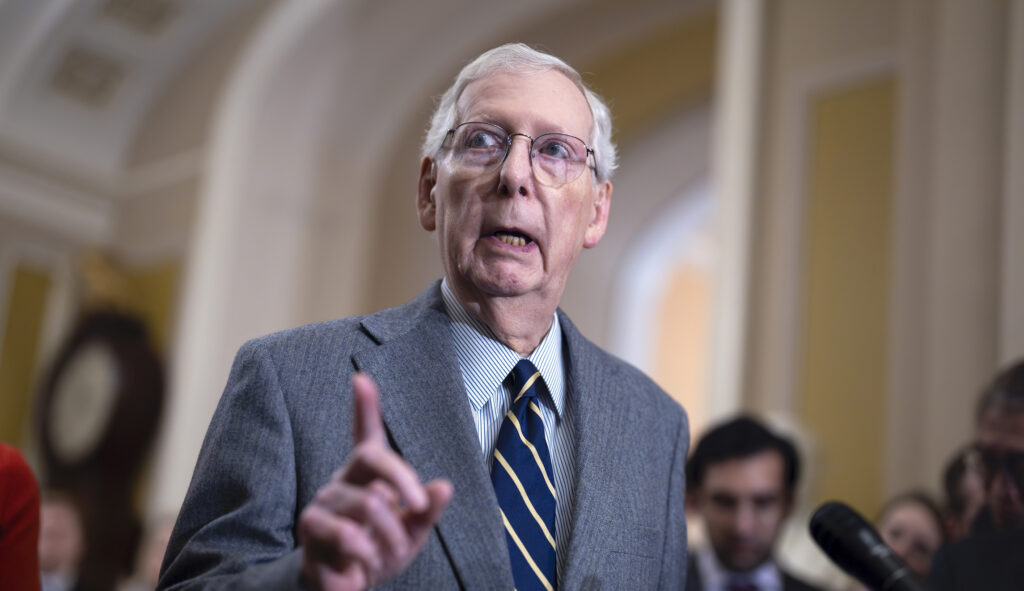
If Republicans win a Senate majority in November, it will be with a dose of irony for Sen. Mitch McConnell (R-KY).
Across several cycles, the Senate Leadership Fund, the big-spending outside group aligned with the GOP leader, will have built that majority with tens of millions invested in electing some of his loudest critics.
There’s Sen. Josh Hawley (R-MO), who argued McConnell was not fit to be leader after he suffered multiple health episodes last year. In 2018, SLF helped clear the Republican primary for him, according to a source familiar with the matter, and spent $21 million unseating his incumbent rival, Democrat Claire McCaskill.
Sen. Ron Johnson (R-WI), who blames McConnell for what he says is decades of “grotesque dysfunction” in Washington, narrowly won a third term in the battleground state of Wisconsin with a $26 million assist from SLF.
Those Republicans reject the idea that loyalty is owed to McConnell for the spending of his allied groups.
“He didn’t do it for me,” Johnson said of SLF’s investments. “It’s because he wanted to be the majority leader.”
“I’m not gonna go, ‘Oh, thank you, thank you, thank you,’ or conduct myself in response to what they did or didn’t spend,” he added, noting the organization sent little to Wisconsin during his 2016 reelection campaign. “I’m just being honest with people.”
Yet McConnell has spent the final years of his tenure as leader presiding over a seeming contradiction. Even as he helped steer money to races most likely to win him the majority, and all the power that comes with it, he simultaneously undermined his grip over the GOP conference by helping elect members hoping to move past him.
Last month, they got their wish. McConnell, citing his age, announced he would retire from leadership in November, serving out the remainder of his term as a rank-and-file member.
His exit has not quieted the barbs of his critics, however. As McConnell announced his retirement, Hawley reacted by calling on him to resign immediately.
It’s possible to see McConnell as a victim of circumstance. His right flank, guided by the anti-establishment fervor of the Tea Party movement and, more recently, the populism of former President Donald Trump, grew resentful of his insular leadership style and increasingly emboldened in stating that view.
But lost in the seeming rebellion is the role McConnell himself played in it all. He’s long been a boogeyman for conservatives tired of seeing Republicans “sell out” the grassroots. Even so, he keeps adding to the ranks of Senate Republicans who subscribe to that view.
Last cycle alone, the SLF sent $32 million to Ohio to assist now-Sen. J.D. Vance (R-OH), an outspoken critic of McConnell’s efforts to send money to Ukraine.
“I’m very appreciative,” Vance said of the investment in Ohio, “but it doesn’t mean we’re not going to have substantive disagreements or hide those disagreements when they come up.”
Last month, Vance told a conservative gathering in Washington, D.C., that McConnell needs to “look in the mirror” and accept that he’s been a “failure” on Ukraine.
That McConnell would support Vance, or really any Republican in a competitive race, is not surprising. In a narrowly divided chamber, the loss of a single seat can hand the majority to the other party.
“Our goal every cycle is to win a Republican majority. We spend where we think we’ll make a difference,” said SLF spokeswoman Torunn Sinclair.
Yet part of McConnell’s legacy will be ushering in a wave of Republicans at odds with him on policy and style.
That was put on display in February when a majority of Senate Republicans rejected a bipartisan border deal he blessed in the face of opposition from Speaker Mike Johnson (R-LA) and Trump.
“You could have people openly criticizing Mitch McConnell in the middle of a general election campaign, and if they’re in a state that can be won, Mitch McConnell will be there,” said Sen. Thom Tillis (R-NC), an adviser to the GOP leader.
“That’s what good leaders do,” he added.

McConnell may once again have to compartmentalize the personal attacks as he looks ahead to November, when Republicans need just two seats, or one if Trump occupies the White House, to retake the majority they lost in 2020.
SLF has not yet reserved ad spending in states beyond Ohio and Montana, but the map includes Florida, where incumbent Sen. Rick Scott (R-FL), the Republican who unsuccessfully challenged McConnell for leader in 2022, is running for a second term.
The group must also decide whether to spend on battlegrounds including Arizona, where the likely Republican candidate, Kari Lake, is a vocal supporter of McConnell’s political nemesis, Trump.
Lake, who met with McConnell at the Capitol last week, declined to criticize him in a brief interview with the Washington Examiner, instead praising his opposition to Trump’s second impeachment and the role he played in appointing conservative judges.
“I don’t agree with him on everything. Guess what? I don’t agree with my husband on everything, and I love my husband. So, I’m not aiming inward. I’m aiming at the people that need to be taken down,” she said, referring to her likely Democratic opponent, Ruben Gallego.
Nonetheless, Lake questioned his competency after he froze in front of reporters in two separate press conferences last year and stands at odds with him on policy. She was one of the foremost critics of his border deal with the White House.
Sen. Marco Rubio (R-FL) said the high-profile differences with members of his conference obscures the fact that those members vote with leadership most of the time.
“That would be true no matter who the leader is,” he said, adding that the goal of any good leader is to build a majority, not impose loyalty tests.
CLICK HERE TO READ MORE FROM THE WASHINGTON EXAMINER
Yet Rubio said conflict is inevitable if Republicans hope to build a coalition large enough to retake the majority. That will be true on Ukraine, but also any political flashpoint, from the border to federal spending to abortion.
“You can’t be a majority party if you don’t have a variety of opinions represented within that party, and we certainly do,” he said.






